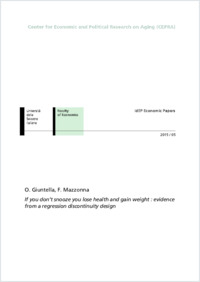If you don’t snooze you lose health and gain weight : evidence from a regression discontinuity design
- Giuntella, Osea Blavatnik School of Government and Nuffield College, University of Oxford, United Kingdom
- Mazzonna, Fabrizio Istituto di economia politica (IdEP), Facoltà di scienze economiche, Università della Svizzera italiana, Svizzera
-
09.07.2015
35 p.
English
Sleep deprivation is increasingly recognized as a public health challenge. While several studies provided evidence of important associations between sleep deprivation and health outcomes, it is less clear whether sleep deprivation is a cause or a marker of poor health. This paper studies the causal effects of sleep on health status and obesity exploiting the relationship between sunset light and circadian rhythms and using time-zone boundaries as an exogenous source of variation in sleep duration and quality. Using data from the American Time Use Survey, we show that individuals living in counties on the eastern side of a time zone boundary go to bed later and sleep less than individuals on the opposite side of the time zone boundary. These findings are driven by individuals whose biological schedules and time use are constrained by social schedules (i.e., work schedules, school starting times). Exploiting these discontinuities, we find evidence that sleep deprivation increases the likelihood of reporting poor health status and the incidence of obesity. Our results suggest that the increase in obesity is explained by both changes in eating behavior and a decrease in physical activity.
- Language
-
- English
- Classification
- Economics
- License
-
License undefined
- Open access status
- green
- Identifiers
-
- RERO DOC 256068
- ARK ark:/12658/srd1318595
- Persistent URL
- https://n2t.net/ark:/12658/srd1318595
Statistics
Document views: 274
File downloads:
- Texte intégral: 282
